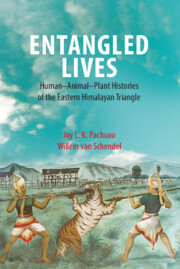5 - Stories of Human Origins
Published online by Cambridge University Press: 15 June 2022
Summary
In Part I of this book, we outlined the geological history of the Triangle and the ways in which humans settled and survived in this complex environment. In this part of the book (covering Chapters 5–7) we turn to how they experienced their lifeworlds and gave meaning to them. They did so in various ways – actually, in so many ways that we must be very selective.
In cultural terms, this part will focus on the Triangle uplands, mainly because upland cultures help us comprehend the history of local world views best. These cultures were relatively lightly touched by external cosmologies that spread early in the lowlands of Assam, Bengal and Myanmar – and had a strong cultural influence there. Today we know these as Hinduism, Buddhism and Islam. Certainly, these traditions had their impact in the uplands as well (just as pre-existing cosmologies in the lowlands deeply influenced local forms of Hinduism, Buddhism and Islam); but this impact was minor and late, except in some localities.
Consequently, specific ‘Triangle world views’ persisted and were recorded in much more detail than those of the lowlands. This is not to say that these views did not change dramatically during the past century or so. First, colonial-era Christian missionary activity was intense in the uplands, and many inhabitants came to identify as Christians. They adopted the world view of that faith but inflected it strongly with their local beliefs, creating upland versions of Christianity. Second, new forms of education, rapidly rising literacy and improving infrastructure exposed them to many new ideas. Even so, the contours of the old world views have not been completely erased, and some are making a partial comeback (Chapter 8).
Triangle stories as historical sources
In this part of the book, we are concerned with how Triangle cultures thought of the place of humans and non-humans in the world. We explore how people in the region have understood their own histories, how they organised their narratives about the past and specifically how these narratives expressed a sense of the shared experience of all living creatures. This chapter explores ideas of human origins. The following chapters (6 and 7) deal with ideas about human–animal and human–plant histories, respectively.
- Type
- Chapter
- Information
- Entangled LivesHuman-Animal-Plant Histories of the Eastern Himalayan Triangle, pp. 63 - 90Publisher: Cambridge University PressPrint publication year: 2022

